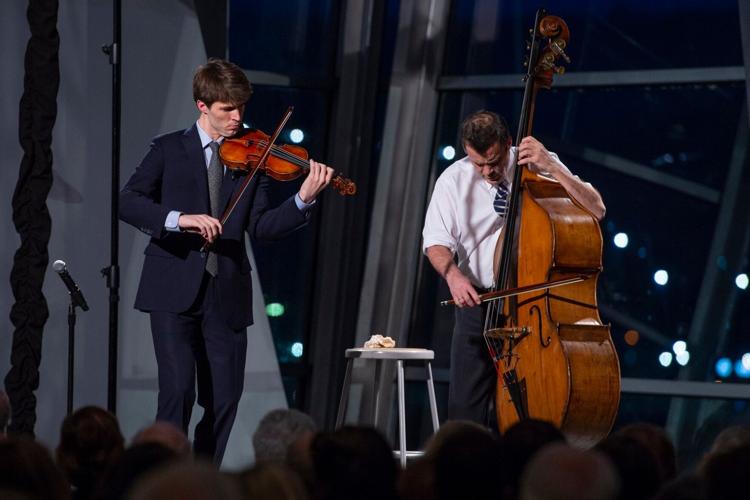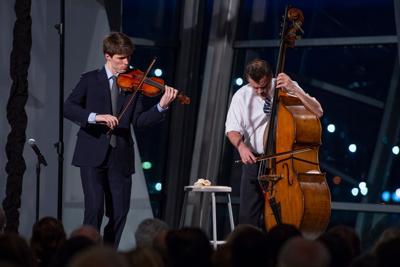It’s not a stretch to say that Edgar Meyer is the most famous and influential classical bassist in the world.
The 2002 MacArthur Fellow (the so-called “genius grant”) has forged an incredible and varied musical history that include classical music compositions, adventurous bluegrass and Americana collaborations, and a great many projects that fit in a fascinating gray area between the two.
Meyer’s concert Feb. 17 at the Johnson Hall at USC's Darla Moore School of Business will exist very much in that liminal space as he and his son George (a graduate of Harvard and Juilliard School, and an accomplished composer, as well) play their co-written, classical-minded duo alongside some traditional fiddle tunes.
According to the duo, their early collaborations were borne out of exactly the kind of family jam sessions you might expect.

A young George Meyer (left) plays the violin with his father, Edgar Meyer, a world-renowned bassist.
“There was lots of music in our house from an early age,” said George. “I think some of the first times we were playing together in front of other people might have been when we played a little tune I wrote in a fiddle camp or something.”
According to the violinist, his childhood consisted of lots of bluegrass festivals and string music gatherings — his mother and Edgar’s wife, Connie Heard, is a violinist on faculty at Vanderbilt University — as well as a slew of famous virtuosos like Chris Thile, Béla Fleck and Mike Marshall playing music with his father in the living room.
“That was a really significant part of childhood, and as an early teen, really just having a chance to be around a lot of people who were all really excited about both fiddle and acoustic music more broadly,” said George. “My dad is as always a big fan of the people he works with, so there was just a lot of enthusiasm to go around.”
That enthusiasm for collaborators is well-evident in the co-composed violin-bass duo that will be the centerpiece of the Feb. 17 concert in Columbia.
In an 18-minute piece in three movements that follows the conventions of classical music, the bassist said many of the rhythmic ideas are based on his work with Indian tabla player Zakir Hussain. Their collaborative album with Fleck, "As We Speak," just picked up two Grammys at the 2024 awards show.
“Zakir has been an incredible influence on me in the last 20 years,” the elder Meyer said. “And we don’t have to simplify (his) rhythms, but we can't do it as fast as he can But he has showed (me) what's going on and we incorporated that as we saw fit.”
As for how his son graduated from student to collaborator, the bassist called it a “slow, ongoing evolution.”

Edgar Meyer is a world-renowned bassist who melds classical, bluegrass and American styles
The violinist began slowly joining the bassist on stage over the years, most notably being called up to play on the encores for a tour Edgar did with Sam Bush and Jerry Douglas. The bassist seems mindful of the fact that his son is still at the beginning of his career, even as they now share the same network of collaborators and musical space. When asked whether he and his son might take their collaboration into the studio, the idea seemed like both a forgone conclusion and something that would have to occur in its own time.
“I would say we’ll almost certainly end up doing the recording. But George needs to do recordings of his own first, probably,” Edgar said. “We would want to record this duo, and it just needs some music to be paired with it. But those are choices that haven’t been made yet.”
Father and son will also take part in an informal discussion at the School of Music Recital Hall on Friday, Feb. 16 at 4 p.m.

George Meyer is an up-and-coming violinist on tour with his father, bassist Edgar Meyer
They'll explore the interconnected relationship between all musical styles, something which practically serves as a thesis for Edgar’s career and is clearly a part of the heritage he hands down to his son, whose artistic statement expresses an interest in “‘classical’ music, in fiddle music and in what they have in common.”
The conversation might even turn back to the Grammys — Edgar Meyer has won seven, two of which were in the “Classical Crossover” category that only existed between 1999 and 2011.
“I don't track that too closely,” Edgar laughed. "The category thing is always a struggle for them. And that’s partially just because music doesn't really work that way, especially these days. As soon as they think they've got a box around it, the music starts to leak around the edges.”













